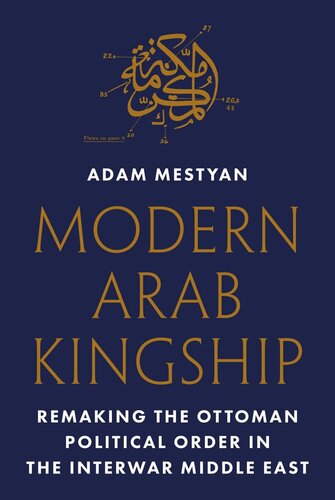

Most ebook files are in PDF format, so you can easily read them using various software such as Foxit Reader or directly on the Google Chrome browser.
Some ebook files are released by publishers in other formats such as .awz, .mobi, .epub, .fb2, etc. You may need to install specific software to read these formats on mobile/PC, such as Calibre.
Please read the tutorial at this link: https://ebookbell.com/faq
We offer FREE conversion to the popular formats you request; however, this may take some time. Therefore, right after payment, please email us, and we will try to provide the service as quickly as possible.
For some exceptional file formats or broken links (if any), please refrain from opening any disputes. Instead, email us first, and we will try to assist within a maximum of 6 hours.
EbookBell Team

4.0
66 reviewsHow the “recycling” of the Ottoman Empire’s uses of genealogy and religion created new political orders in the Middle East
In this groundbreaking book, Adam Mestyan argues that post-Ottoman Arab political orders were not, as many historians believe, products of European colonialism but of the process of “recycling empire.” Mestyan shows that in the post–World War I Middle East, Allied Powers officials and ex-Ottoman patricians collaborated to remake imperial institutions, recycling earlier Ottoman uses of genealogy and religion in the creation of new polities, with the exception of colonized Palestine. The polities, he contends, should be understood not in terms of colonies and nation states but as subordinated sovereign local states—localized regimes of religious, ethnic, and dynastic sources of imperial authority. Meanwhile, governance without sovereignty became the new form of Western domination.
Drawing on hitherto unused Ottoman, French, Syrian, and Saudi archival sources, Mestyan explores ideas and practices of creating composite polities in the interwar Middle East and, doing so, sheds light on local agency in the making of the forgotten Kingdom of the Hijaz, Jordan, Egypt, Saudi Arabia, and Syria, the first Muslim republic. Mestyan considers the adjustment of imperial Islam to a world without a Muslim empire, discussing the post-Ottoman Egyptian monarchy and the intertwined making of Saudi Arabia and the State of Syria in the 1920s and 1930s.
Mestyan’s innovative analysis shows how an empire-based theory of the modern political order can help refine our understanding of political dynamics throughout the twentieth century and down to the turbulent present day.